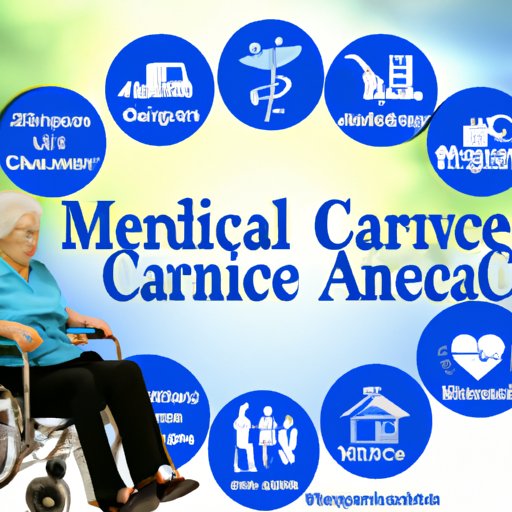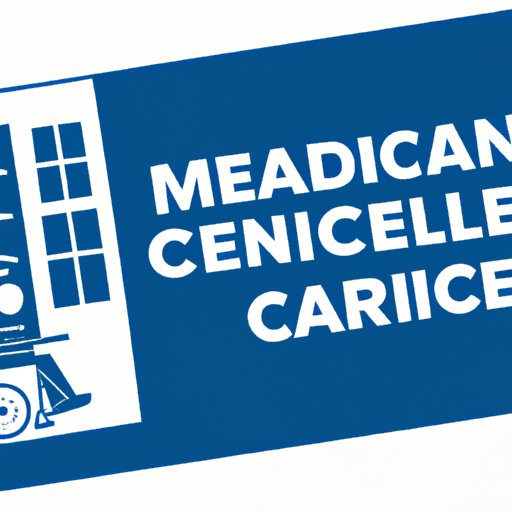Introduction
Medicare is a federal health insurance program that provides coverage for people 65 and older, as well as some individuals with disabilities. Medicare covers a wide range of health care services, including in home care. In home care is a type of medical care provided in the patient’s home, rather than in a hospital or other medical setting. In home care can be provided by a variety of health care professionals, including nurses, therapists, and personal care aides. In this article, we will explore the types of in home care services covered by Medicare, as well as resources available to help cover the cost of in home care.

Exploring Different Types of In Home Care Services Covered by Medicare
Medicare covers a range of in home care services, including skilled nursing, physical, occupational, and speech therapy, and personal care services. Let’s take a closer look at each of these services.
Skilled Nursing Services
Skilled nursing services are provided by registered nurses (RNs), licensed practical nurses (LPNs), or certified nurse assistants (CNAs). These services can include wound care, catheter care, medication management, and more. According to the Centers for Medicare & Medicaid Services (CMS), “Medicare Part A (Hospital Insurance) pays for certain inpatient skilled nursing facility (SNF) care.”
Physical, Occupational, and Speech Therapy Services
Physical, occupational, and speech therapy services can help patients regain strength and mobility after an illness or injury. These services can also help individuals with chronic conditions or disabilities manage their symptoms. Physical therapy focuses on improving muscle strength and coordination. Occupational therapy focuses on helping patients perform daily activities, such as dressing and bathing. Speech therapy helps patients improve communication skills, such as speaking and understanding language. According to CMS, “Medicare Part B (Medical Insurance) covers medically necessary outpatient physical, occupational, and speech-language therapy services when ordered by a doctor.”
Personal Care Services
Personal care services are designed to help patients with everyday tasks, such as bathing, dressing, and grooming. These services can also include light housekeeping, meal preparation, and errand running. According to CMS, “Medicare does not cover personal care services such as bathing, dressing, and using the bathroom.” However, some Medicare Advantage plans may offer coverage for these services.
What Resources Are Available to Help Cover the Cost of In Home Care?
In addition to Medicare, there are several other resources available to help cover the cost of in home care. These include Medicare Advantage plans, Medicaid, long-term care insurance, and veterans benefits.
Medicare Advantage Plans
Medicare Advantage plans are private health insurance plans that provide coverage for services covered by Medicare Parts A and B. Some Medicare Advantage plans may offer additional coverage for services not covered by original Medicare, such as prescription drugs, vision, hearing, and in home care. It’s important to note that coverage varies from plan to plan, so it’s important to compare plans before enrolling in one.
Medicaid
Medicaid is a joint state and federal health insurance program for individuals and families with low incomes. Medicaid can help cover the cost of in home care for those who qualify. Eligibility requirements vary from state to state, so it’s important to check with your state Medicaid office for more information.
Long-Term Care Insurance
Long-term care insurance is a type of insurance policy that helps cover the cost of in home care. Policies vary, but they typically cover costs associated with nursing home care, assisted living, and in home care. Premiums and coverage limits vary, so it’s important to compare policies before purchasing one.
Veterans Benefits
The U.S. Department of Veterans Affairs (VA) offers several benefits programs that can help cover the cost of in home care. These programs include the VA Aid & Attendance Pension and the VA Homebound Pension. To be eligible for these programs, veterans must meet certain criteria. For more information, contact your local VA office.
Common Questions About Medicare and In Home Care
When it comes to Medicare and in home care, there are several common questions. Let’s take a look at a few of them.
Who Qualifies for In Home Care?
In order to qualify for in home care, you must be enrolled in Medicare Part A and Part B, and have a doctor’s order for the services. Your doctor must also certify that the services are medically necessary. Additionally, you must be able to demonstrate that you need assistance with activities of daily living, such as bathing, dressing, and eating.
How Much Does Medicare Pay for In Home Care?
The amount Medicare pays for in home care depends on the type and level of service being provided. Generally speaking, Medicare will pay 80% of the approved amount for covered services. The remaining 20% is usually the patient’s responsibility, although some Medicare Advantage plans may offer additional coverage for in home care services.
What Are the Limitations to Medicare Coverage for In Home Care?
Medicare coverage for in home care is limited to medically necessary services ordered by a doctor. Additionally, Medicare does not cover services such as bathing, dressing, and using the bathroom. Some Medicare Advantage plans may offer additional coverage for these services.

How to Choose an In Home Care Provider That Accepts Medicare
When choosing an in home care provider, it’s important to make sure they accept Medicare. Here are a few tips to help you find a provider that accepts Medicare:
Researching Providers
Start by researching providers in your area. Ask friends, family, and your doctor for recommendations. You can also use online resources such as Medicare.gov to search for providers in your area.
Comparing Costs
Once you’ve identified potential providers, compare their costs. Make sure to factor in out-of-pocket expenses, such as copays and deductibles. Additionally, ask if the provider offers any financial assistance programs.
Reviewing Licensing and Accreditation
Finally, make sure the provider is properly licensed and accredited. Check with your state licensing board to make sure the provider is in good standing. Additionally, ask the provider for proof of accreditation from national organizations such as the Joint Commission or the National Institute for Health Care Excellence.
Conclusion
In this article, we explored the types of in home care services covered by Medicare, as well as resources available to help cover the cost of in home care. We also discussed common questions about Medicare and in home care, and how to choose an in home care provider that accepts Medicare. If you’re considering in home care services, it’s important to research your options to ensure you get the best care possible.
(Note: Is this article not meeting your expectations? Do you have knowledge or insights to share? Unlock new opportunities and expand your reach by joining our authors team. Click Registration to join us and share your expertise with our readers.)
